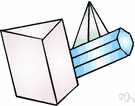prism
(redirected from Prisms)Also found in: Thesaurus, Medical, Acronyms, Encyclopedia.
prism
(prĭz′əm)n.
1. A solid figure whose bases or ends have the same size and shape and are parallel to one another, and each of whose sides is a parallelogram.
2. A transparent body of this form, often of glass and usually with triangular ends, used for separating white light passed through it into a spectrum or for reflecting beams of light.
3. A cut-glass object, such as a pendant of a chandelier.
4. A crystal form consisting of three or more similar faces parallel to a single axis.
5. A medium that misrepresents whatever is seen through it.
[Late Latin prīsma, from Greek prīsma, thing sawed off, prism, from prīzein, to saw, variant of prīein.]
American Heritage® Dictionary of the English Language, Fifth Edition. Copyright © 2016 by Houghton Mifflin Harcourt Publishing Company. Published by Houghton Mifflin Harcourt Publishing Company. All rights reserved.
prism
(ˈprɪzəm)n
1. (General Physics) a transparent polygonal solid, often having triangular ends and rectangular sides, for dispersing light into a spectrum or for reflecting and deviating light. They are used in spectroscopes, binoculars, periscopes, etc
2. (General Physics) a form of crystal with faces parallel to the vertical axis
3. (Mathematics) maths a polyhedron having parallel, polygonal, and congruent bases and sides that are parallelograms
[C16: from Medieval Latin prisma, from Greek: something shaped by sawing, from prizein to saw]
Collins English Dictionary – Complete and Unabridged, 12th Edition 2014 © HarperCollins Publishers 1991, 1994, 1998, 2000, 2003, 2006, 2007, 2009, 2011, 2014
prism
(ˈprɪz əm)n.
1. Optics. a transparent solid body, often having triangular bases, used for dispersing light into a spectrum or for reflecting rays of light.
2. Geom. a solid having bases or ends that are parallel, congruent polygons and sides that are parallelograms.
3. Crystall. a form having faces parallel to the vertical axis and intersecting the horizontal axes.
[1560–70; < Late Latin prīsma < Greek prîsma literally, something sawed, akin to prizein to saw, prístēs sawyer]
Random House Kernerman Webster's College Dictionary, © 2010 K Dictionaries Ltd. Copyright 2005, 1997, 1991 by Random House, Inc. All rights reserved.
prism
(prĭz′əm)1. A geometric solid whose bases are congruent polygons lying in parallel planes and whose sides are parallelograms.
2. A solid of this type, often made of glass with triangular ends, used to disperse light and break it up into a spectrum.
The American Heritage® Student Science Dictionary, Second Edition. Copyright © 2014 by Houghton Mifflin Harcourt Publishing Company. Published by Houghton Mifflin Harcourt Publishing Company. All rights reserved.
prism
A transparent, solid object, with at least two plane faces, that bends a light beam and splits it into its component colors.
Dictionary of Unfamiliar Words by Diagram Group Copyright © 2008 by Diagram Visual Information Limited
ThesaurusAntonymsRelated WordsSynonymsLegend:
Switch to new thesaurus
| Noun | 1. |  prism - a polyhedron with two congruent and parallel faces (the bases) and whose lateral faces are parallelograms prism - a polyhedron with two congruent and parallel faces (the bases) and whose lateral faces are parallelogramspolyhedron - a solid figure bounded by plane polygons or faces parallelepiped, parallelepipedon, parallelopiped, parallelopipedon - a prism whose bases are parallelograms quadrangular prism - a prism whose bases are quadrangles triangular prism - a prism whose bases are triangles |
| 2. |  prism - optical device having a triangular shape and made of glass or quartz; used to deviate a beam or invert an image prism - optical device having a triangular shape and made of glass or quartz; used to deviate a beam or invert an imagebiprism - an optical device for obtaining interference fringes erecting prism - a right-angled optical prism used to turn an inverted image upright optical device - a device for producing or controlling light prism spectroscope, spectroscope - an optical instrument for spectrographic analysis |
Based on WordNet 3.0, Farlex clipart collection. © 2003-2012 Princeton University, Farlex Inc.
Translations
مَنشورمَوْشور
hranolprizma
prisme
prisma, strendingurstrendingur
prizmėprizminis
prizma
graniastosłuppryzmat
hranolprizma
Collins Spanish Dictionary - Complete and Unabridged 8th Edition 2005 © William Collins Sons & Co. Ltd. 1971, 1988 © HarperCollins Publishers 1992, 1993, 1996, 1997, 2000, 2003, 2005
Collins English/French Electronic Resource. © HarperCollins Publishers 2005
prism
n → Prisma nt
Collins German Dictionary – Complete and Unabridged 7th Edition 2005. © William Collins Sons & Co. Ltd. 1980 © HarperCollins Publishers 1991, 1997, 1999, 2004, 2005, 2007
Collins Italian Dictionary 1st Edition © HarperCollins Publishers 1995
prism
(ˈprizm) noun1. a solid figure whose sides are parallel and whose two ends are the same in shape and size.
2. a glass object of this shape, usually with triangular ends, which breaks up a beam of white light into the colours of the rainbow.
prisˈmatic (-ˈma-) adjectiveKernerman English Multilingual Dictionary © 2006-2013 K Dictionaries Ltd.